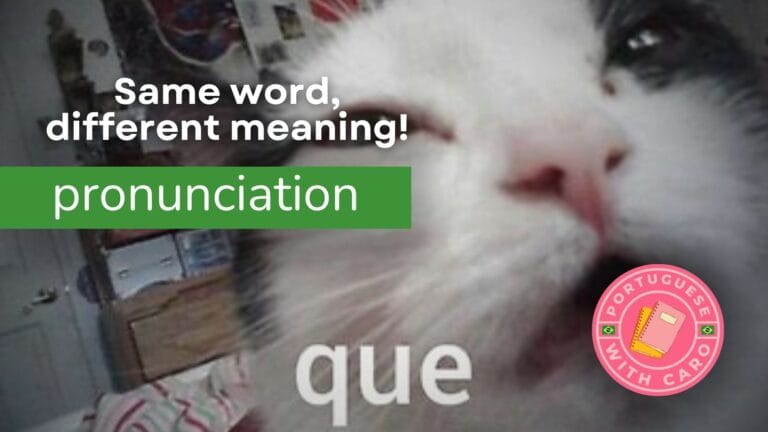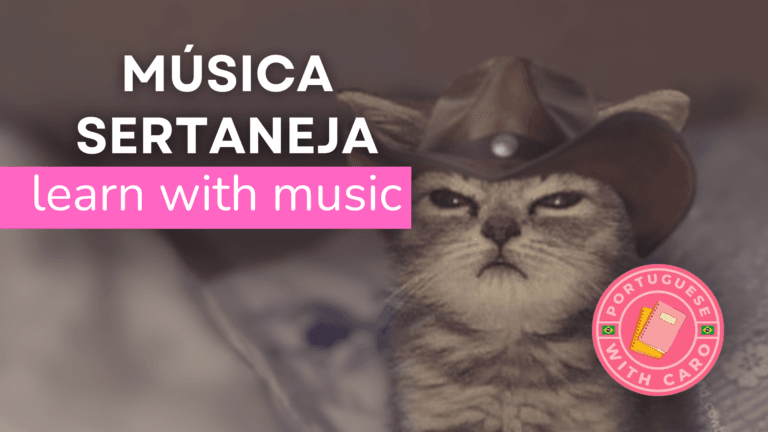Cada língua tem palavras únicas que refletem sua cultura e jeito de pensar. No português brasileiro, existem termos sem tradução direta para o inglês, porque expressam conceitos muito específicos. Alguns até podem ser explicados com frases, mas não existe uma única palavra que signifique exatamente a mesma coisa.
Aqui estão 10 palavras brasileiras que não existem em inglês, mas bem que poderiam!
Every language has unique words that reflect its culture and way of thinking. In Brazilian Portuguese, there are terms with no direct translation into English because they express very specific concepts. Some of them can be explained with sentences, but there’s no single word that matches exactly.
Here are 10 Brazilian words that don’t exist in English, but totally should!
1. Cafuné
Carinho feito com os dedos na cabeça de alguém, passando a mão suavemente pelos cabelos.
A gentle caress on someone’s head, running fingers softly through their hair. Running fingers through someone’s hair lovingly ou head caress.
“Eu amo quando fazem cafuné no meu cabelo.”
“I love it when people stroke my hair.”
“Minha mãe fazia cafuné em mim todos os dias antes de eu dormir.”
“My mother would pet me every day before I went to sleep.”
2. Saudade
Aquele sentimento profundo de falta de algo ou alguém; um misto de tristeza pela falta e felicidade pela lembrança boa.
That deep feeling of missing something or someone; a mix of sadness due to the absence and happiness due to the good memory.
“Tenho saudade dos verões na casa da minha avó.”
“I miss the summers I spent at my grandmother’s house.”
“Nunca pensei que sentiria saudade da escola, mas sinto.”
“I never thought I’d miss school, but I do.”
3. Chulé
Chulé é o mau cheiro nos pés causado pelo suor e o uso de sapatos fechados por muito tempo.
The bad smell that comes from feet due to sweat and wearing closed shoes for too long.
“Meu irmão tem um chulé terrível depois da academia.”
“My brother’s feet smell terrible after the gym.”
“O chulé dele invadiu a sala toda!”
“His foot odor took over the entire room!”
4. Xodó
Algo ou alguém pelo qual se tem um carinho especial, podendo ser uma pessoa, um objeto ou até um animal de estimação.
Something or someone you deeply love and cherish. It can be a pet, a beloved object, or a special person.
“Esse violão é meu xodó, cuido dele com muito carinho.”
“This guitar is my treasure; I take great care of it.”
“Meu vô dizia que minha vó era o xodó da vida dele.”
“My grandpa used to say my grandma was the love of his life.”
5. Anteontem
Anteontem é o dia que veio antes de ontem. Ou seja, se hoje é quarta-feira, anteontem foi segunda-feira.
“Anteontem” is the day that came before yesterday. If today is Wednesday, “anteontem” was Monday.
“Você lembra o que aconteceu anteontem na festa?”
“Do you remember what happened at the party the day before yesterday?”
“Eu fui ao cinema anteontem com meus amigos.”
“I went to the movies the day before yesterday with my friends.”
6. Friorento / Friento
Uma pessoa friorenta sente frio com facilidade, mesmo quando outras pessoas não acham que está frio.
Someone who gets cold easily, even when others don’t feel cold.
“Ele é tão friorento que dorme com dois cobertores.”
“He gets so cold that he sleeps with two blankets.”
“Eu sou friorenta, então sempre levo um moletom comigo.”
“I get cold easily, so I always carry a sweatshirt with me.”
7. Calorento
Uma pessoa calorenta sente muito calor com facilidade, mesmo quando outras pessoas não acham quente.
Someone who gets hot easily, even when others don’t find it warm.
“Eu sou calorenta, então odeio usar blusas de manga comprida.”
“I get hot easily, so I hate wearing long-sleeved shirts.”
“Mesmo no frio, os calorentos da família continuam de bermuda.”
“Even in the cold, the heat-sensitive ones in the family still wear shorts.”
8. Muvuca
Pode significar uma grande aglomeração de pessoas, confusão ou bagunça. É usada para descrever desde festas lotadas até situações caóticas.
A large crowd of people, a chaotic situation, or a messy place. It can refer to packed parties or general disorder.
“Não gosto de muvuca, prefiro lugares tranquilos.”
“I don’t like crowds; I prefer quiet places.”
“O shopping virou uma muvuca por causa da promoção.”
“The mall became a mess because of the sale.”
9. Gambiarra
Uma solução improvisada e criativa para resolver um problema, muitas vezes de forma temporária e sem muitos recursos.
A quick, improvised, and creative solution to a problem, often temporary and made with limited resources.
“Fiz uma gambiarra para consertar o chuveiro até o encanador chegar.”
“I made a quick fix to the shower until the plumber arrives.”
“O carregador quebrou, então fiz uma gambiarra com fita isolante.”
“My charger broke, so I did a quick fix with electrical tape.”
10. Rolê
Uma saída para passear, explorar lugares ou se divertir, sozinho ou acompanhado. Pode ser algo planejado, como uma festa ou um encontro com amigos, ou espontâneo, como uma caminhada sem destino certo.
Going out to walk around, explore places, or have fun, either alone or with others. It can be something planned, like a party or a meetup with friends, or spontaneous, like a walk with no set destination.
“O rolê com a galera ontem foi incrível!”
“The hangout with the gang yesterday was amazing!”
“Meu rolê favorito é andar de bicicleta ouvindo música.”
“My favorite outing is riding my bike while listening to music.”
Essas palavras nos mostram como a língua reflete a cultura e o jeito de ver o mundo. Mesmo que não tenha uma tradução exata, é interessante perceber como elas capturam sentimentos e situações que muitas vezes são difíceis de explicar em outro idioma. Agora que você conheceu essas palavras, que tal tentar usá-las para se conectar ainda mais com a cultura brasileira?
These words show how language reflects culture and the way we see the world. Even though there’s no exact translation, it’s interesting to see how they capture feelings and situations that are often hard to explain in another language. Now that you’ve learned these words, how about trying to use them to connect even more with Brazilian culture?




